An Image of Pretty is Confirmed
A visit to Prince Edward Island (PEI) of Canada confirms that pretty windswept beaches, sand dunes, rocky coastlines, operating Lighthouses, estuary’s, and meandering rivers are in great supply.
A visit to PEI reveals that the story of the Anne of Green Gables novels continues to thrive into the 21st century.
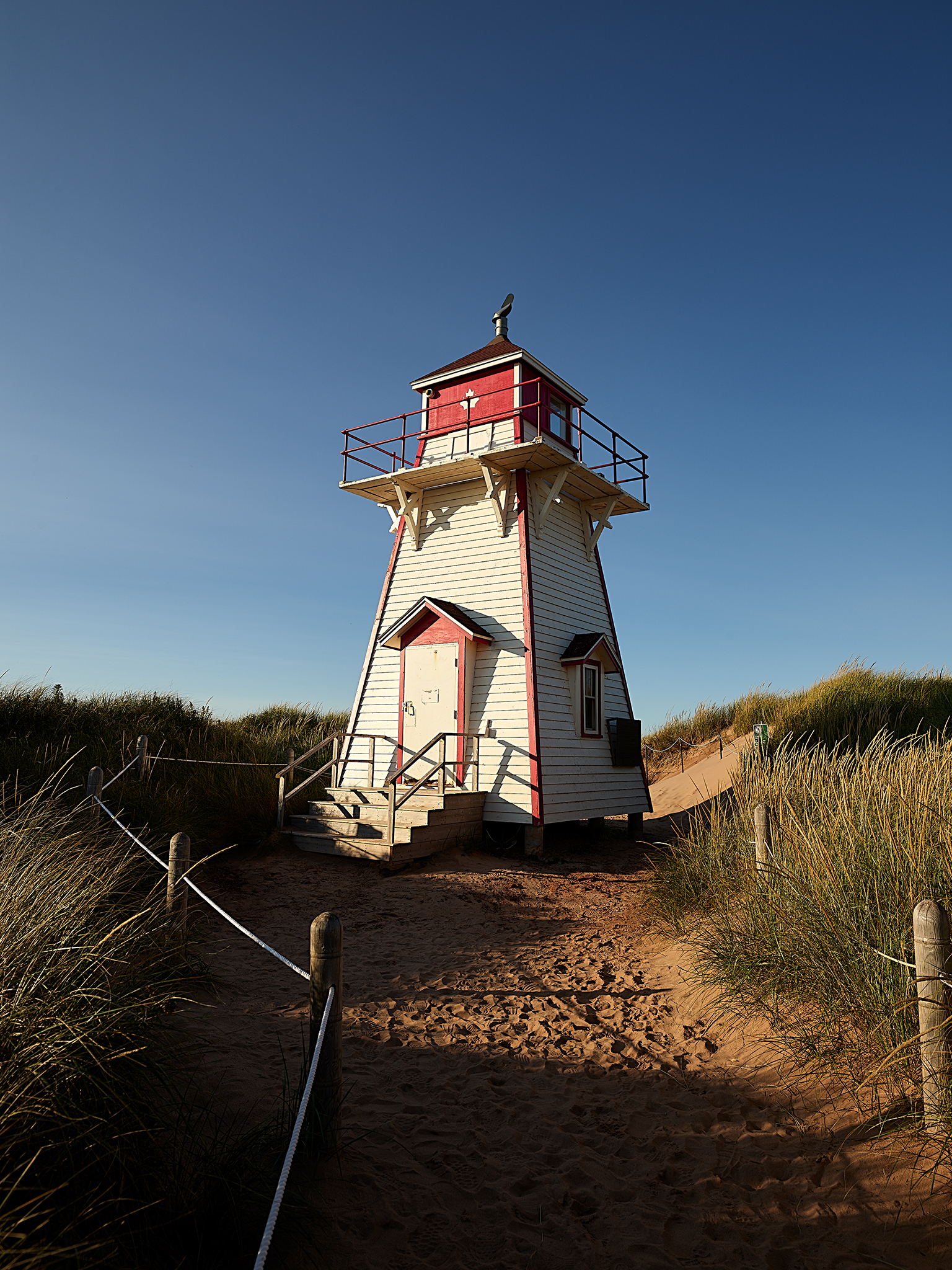
Covehead Lighthouse PEI National Park
The Unanticipated (Pretty Much)
My visit to PEI presented me with some surprises.
It is a serious farming community. The island is Canada’s smallest province at 1.4 million acres. However, 40% of the land is involved in agriculture PEI produces 25% of Canada’s potatoes.
PEI is the most densely populated province in Canada. It has 70.6 people per square mile. PEI has a population of 178,500. Charlottetown is PEI’s largest city (40,000 city 78,000 metro). Charlottetown is a college town. The University of PEI and Holland College are located in Charlottetown.
PEI has the highest concentration of roads in Canada. There are 2,300+ paved and 900+ unpaved miles of road. At 8 miles in length, the Confederation Bridge – connecting PEI and New Brunswick – is the longest in Canada. It is the longest bridge in the world that spans a iced covered body of water. There is a Fee of $50.25 to cross the bridge when leaving. The bridge was finished in 1997. Until that time, a ferry crossing from Charlottetown to New Brunswick was the standard means of getting onto or off-of PEI.
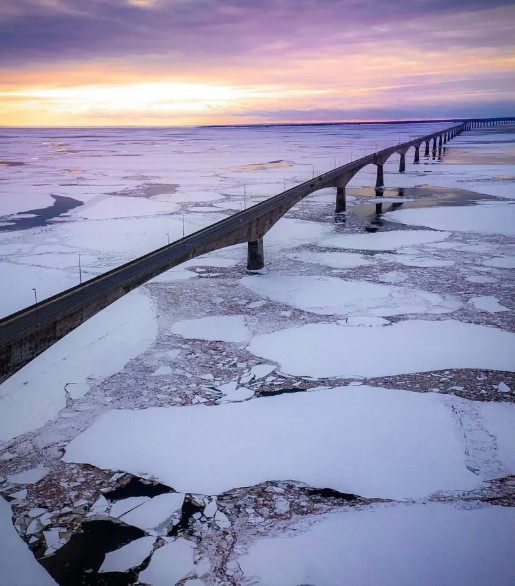
Confederation Bridge in Winter. Courtesy Welcome PEI
The History
PEI of today has no hesitation sharing, if not wearing, its history.
The short, short elevator ride version: think First Nations, French, British, and Canadian Federation as the controlling body.
PEI was part of the traditional lands of the Mi’kmaq. It became known as St. John’s Island, part of the French Colony of Acadia (1604). The global conflict known as Seven Years War spread across the Atlantic Ocean and impacted residents of North America. Its end resulted in the Treaty of Paris in 1763. The implication to St. John’s Island? It was now part of the Nova Scotia the first North American Colony of Great Britain. Things changed quickly as the island was carved away from Nova Scotia by the British and made its own Colony in 1798 and given the name Prince Edward Island.
Some 6o+ years later PEI held what would be called the Charlottetown Conference . The Topic? Creating a Union of the Maritime Provinces. This would not be the only meeting or the final scope of possible moves. As a result, the Canadian Confederation was established on 1 July 1867. At first PEI did not join the Confederation. However, money, land ownership issues and the advent of the railroad effectively forced PEI’s hand. PEI joined as Canada’s seventh province on 1 July 1873.
Strangely Familiar Yet Dramatically Different
Travelling around PEI evoked within me a variety of feelings. At times, I felt as if I was in my birth state of Michigan, travelling from my college town of East Lansing (Michigan State) to my wife’s farm (Shepard Michigan). The college campus, roads, farms, houses, big box stores and chain restaurants looked as if you were in middle-America. I did not experience this feeling while in New Brunswick or Nova Scotia.
However, in just a blink of an eye, It was if I was in a completely different world. This world consisted of homes, salt water ocean, beaches, and rocky coastlines set in the 19th and early 20th century. PEI was every bit the picturesque island I expected. Perhaps even more.
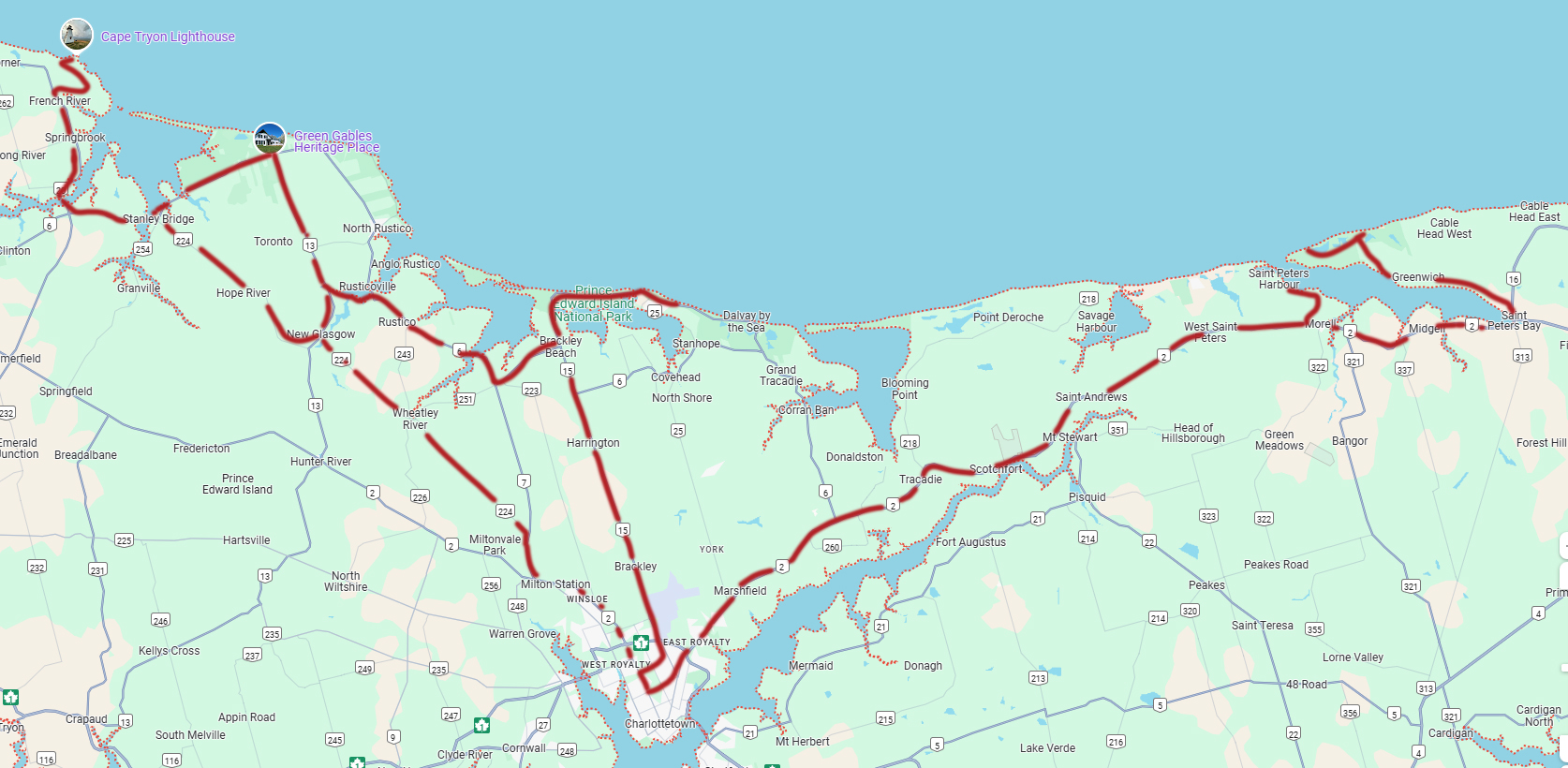
Jeff and Linda’s Road Trip routes in Red.
The Lighthouse and Ann of Green Gables Field Trip
There were a number of places Linda and I hoped we could visit.
- Greenwich Beach in PEI National Park (north and east from Charlottetown).
- Green Gables Heritage Place (north of Charlotte Charlottetown).
- French River and Cape Tyron Lighthouse (north and west of Charlottetown).
- Covehead Harbor and Lighthouse
Greenwich Beach
The trip to Greenwich Beach from Charlottetown starts with a city, exurb feel. From my perspective this might as well be middle-of-the-mitten Michigan. Our travel is during the 2nd week of October. The farms are selling pumpkins. Most of the farms have new homes. The vast majority of the homes are pre-fabricated manufactured. The farms look to be well maintained.
However, as we get closer to the coast and St. Peters Bay and starting at the town of Morrell, the feeling changes. The homes are bigger, older and not pre-fabricated. By the time we reach the town of St. Peters, the Maritimes of Canada are present – front and center. The feel has changed dramatically in the 30 miles traveled.
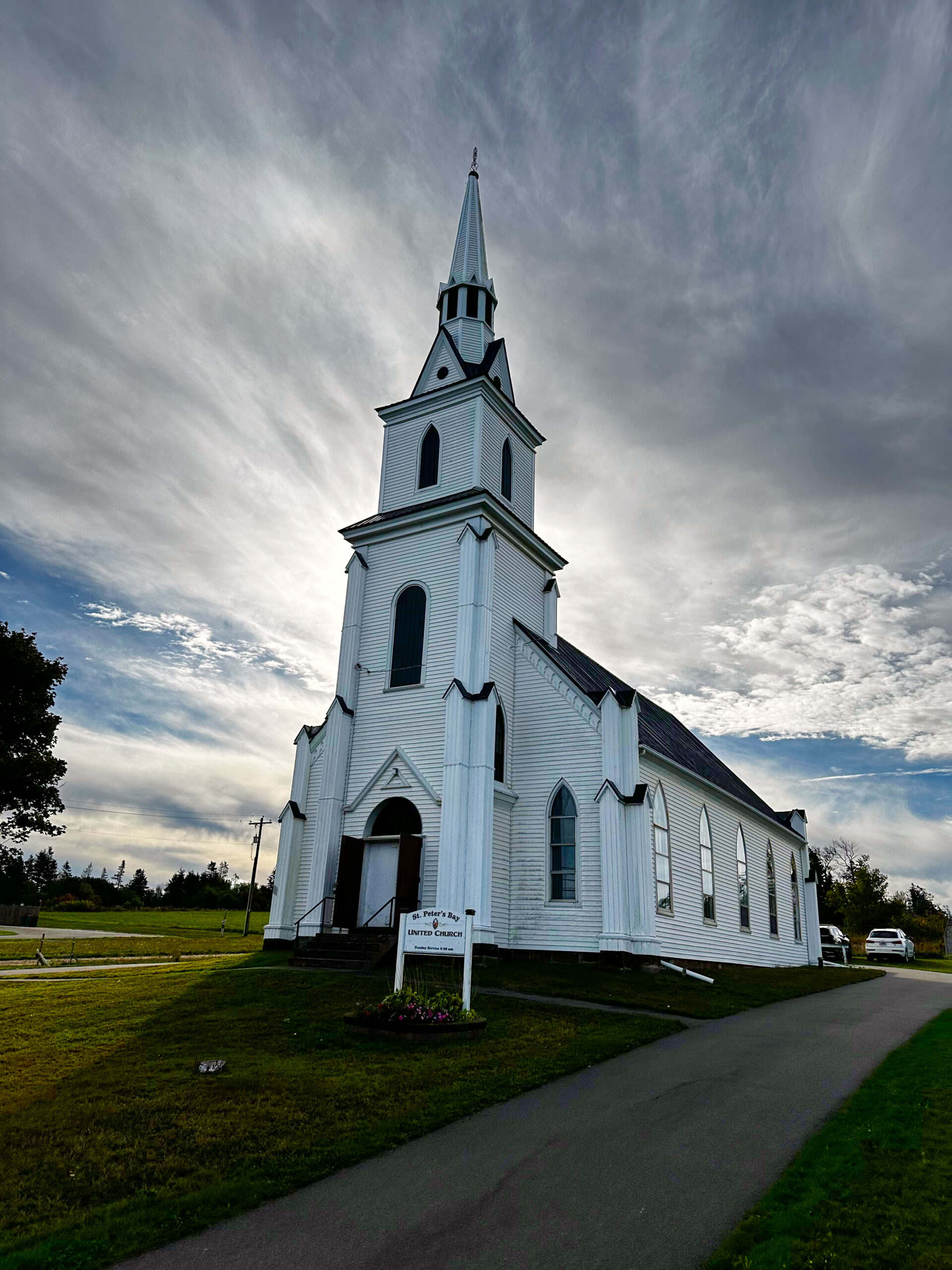
St. Peters Church United Church in early AM. Upon our return from the National Park, the church is packed with cars and attendees.
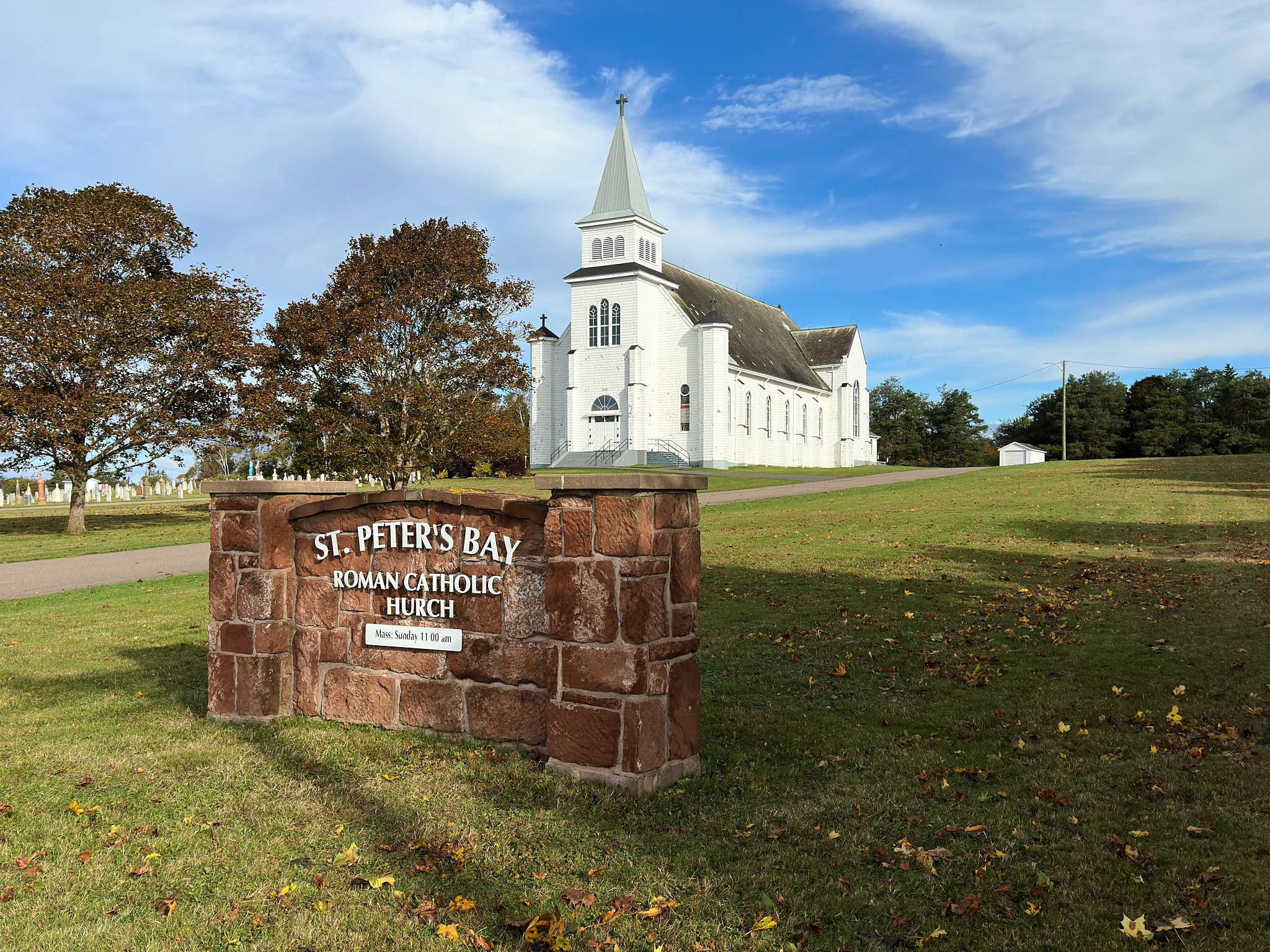
St. Peters Church Roman Church in early AM.
The parking lot at the National Park is empty at our mid-morning arrival. The park feels as if it is our own private place.
The area between the parking lot and the marshes, ponds, dunes, and waterfront was once farmland. The farm and the surrounding area was donated by the land-owners to become part of the National Park. Along the trails heading to the water are remnants of the farm era. Rose bushes, maple trees and plenty of open land.

Wild Rose Bush.

Fall time is here.
The forested trail opens up onto Bowley Pond. The weather pattern is changing materially, the gray overcast skies at our start in Charlottetown are dissipating quickly and clouds are swirling about. It feels as if I am viewing a living water color painting. A boardwalk crosses the pond. There are four more ponds and marshes of similar size to Bowley to its east.
Towards the boardwalk’s end dunes appear all around. These are large dunes with Native grasses swaying.
There are stairs at the end of the boardwalk allowing you to go up, over, and down the dunes to the beach. There is beach to the east and west and as far as the eye can see. The Greenwich dunes are the largest on PEI.
The Dunes
The dunes at Greenwich Beach are unusually large mobile Parabolic dunes with an associated counter ridge (Gegenwälle). Evidently, the Greenwich Beach dunes are a rarity.
Another exciting aspect of the visit Greenwich Beach: practically no-one is around. Four female college students engage with us for a few minutes. They are exceedingly pleasant.
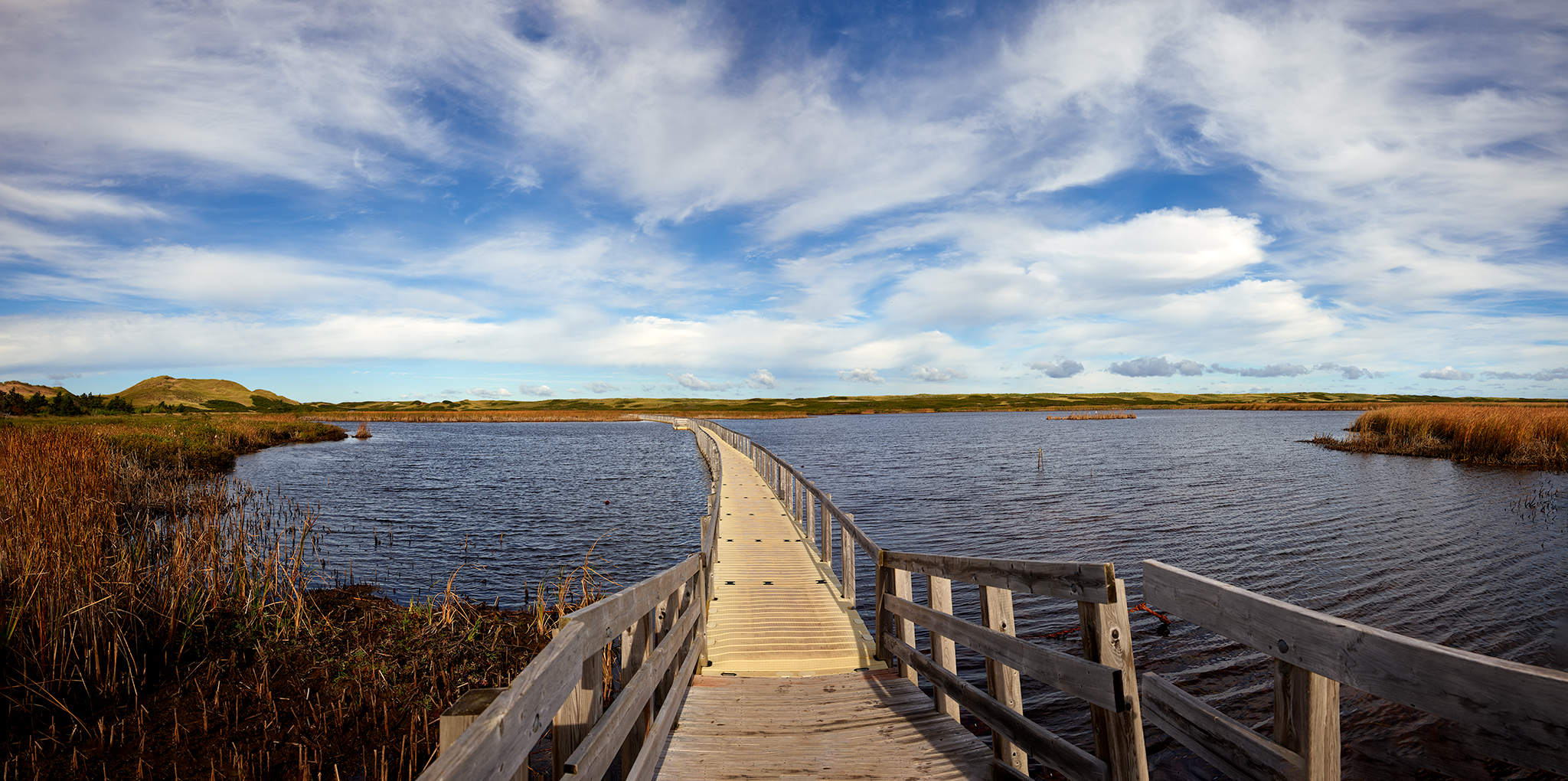
Bowley Pond and the boardwalk leading to the dunes.
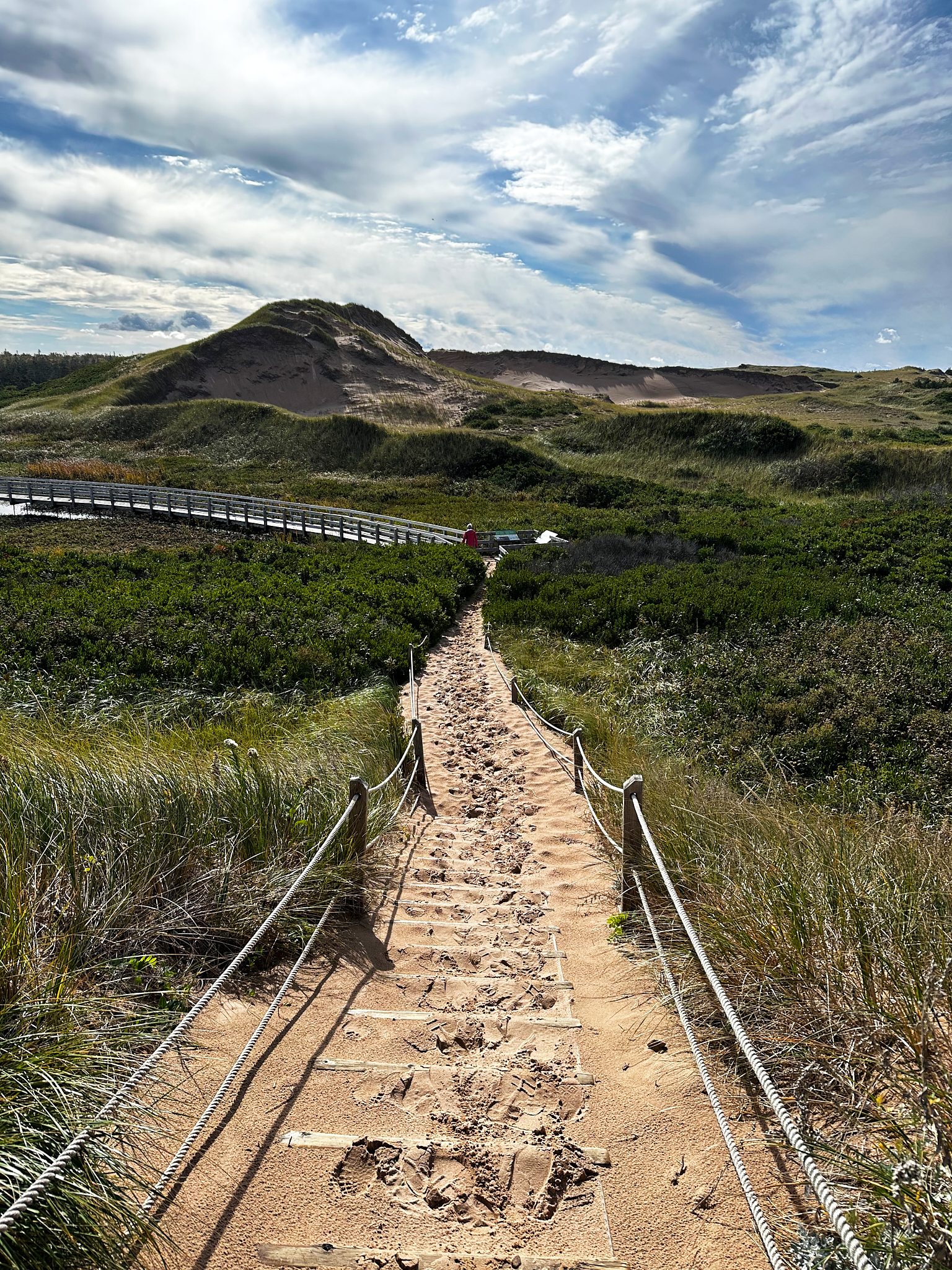
The dunes
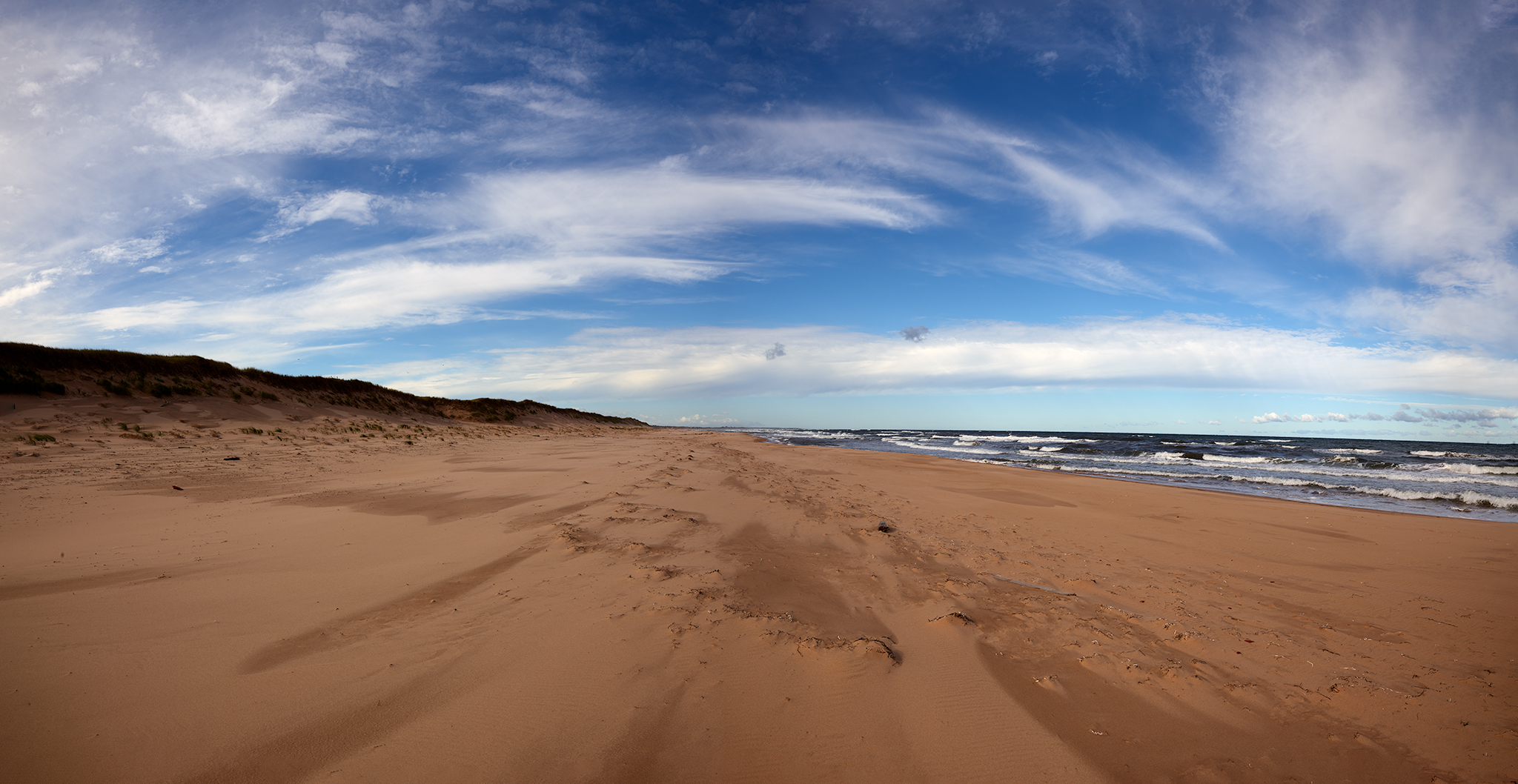
Greenwich Beach
Green Gables Heritage Place
The story of Canadian author Lucy Maud Montgomery and her Anne of Green Gables novels are legendary. Linda read all of them as a young girl. All eight in the series remain in her possession and live in our cabin in the Sawtooth Mountains of Idaho.
There are effectively three venues that pay tribute to Montgomery, Green Gables Heritage Place, Anne of Green Gables Museum, and Lucy Maud Montgomery Birthplace. A fourth would be the Musical Anne & Gilbert staged in Charlottetown in the Florence Simmons Performance Hall at Holland College. The Musical is in its 21st year.
We choose to visit Heritage Place, see the Birthplace, and attend the Musical.
Heritage Place is part of the Canadian National Park system. The Museum, Birthplace, and Musical are private operations. Heritage place is well worth the visit. Its presentation of Montgomery and her life is top notch. Montgomery was a remarkable person. There is much more to her story than the Anne of Greene Gables novels.
The Musical Anne & Gilbert is a highly rewarding experience. The quality of the staging, singing and acting is a pleasant surprise.
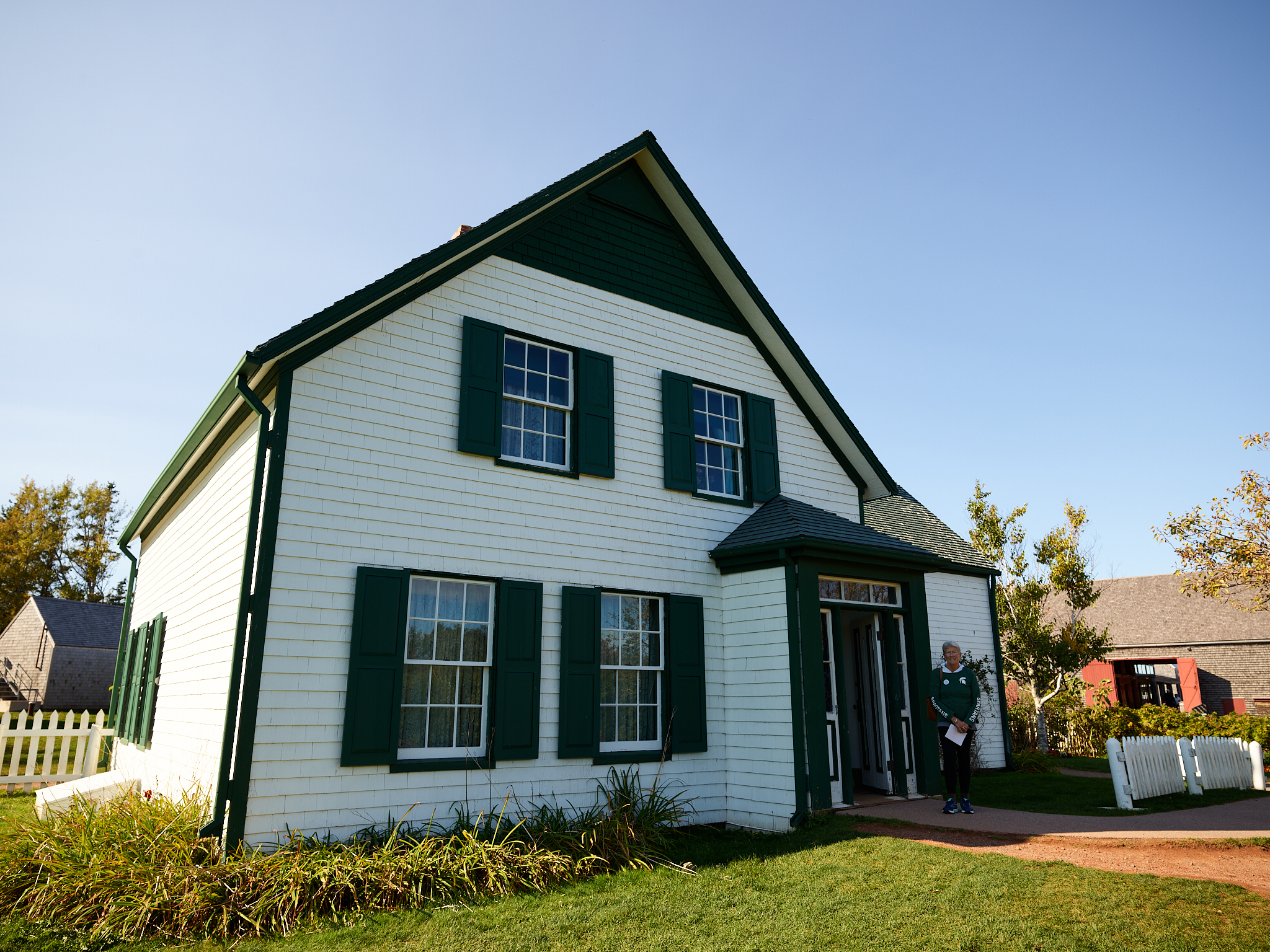
Green Gables House
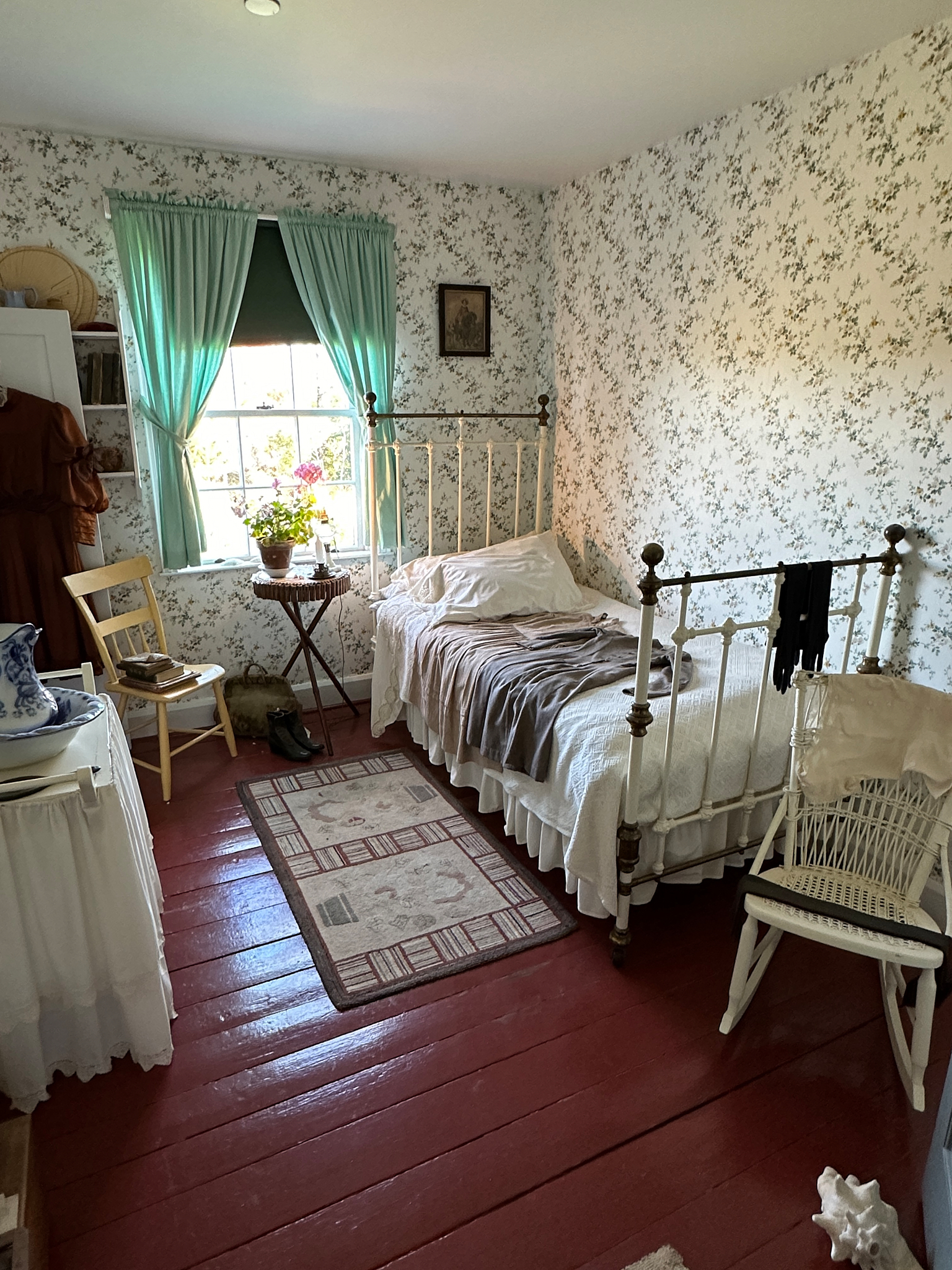
A room in the Green Gables House
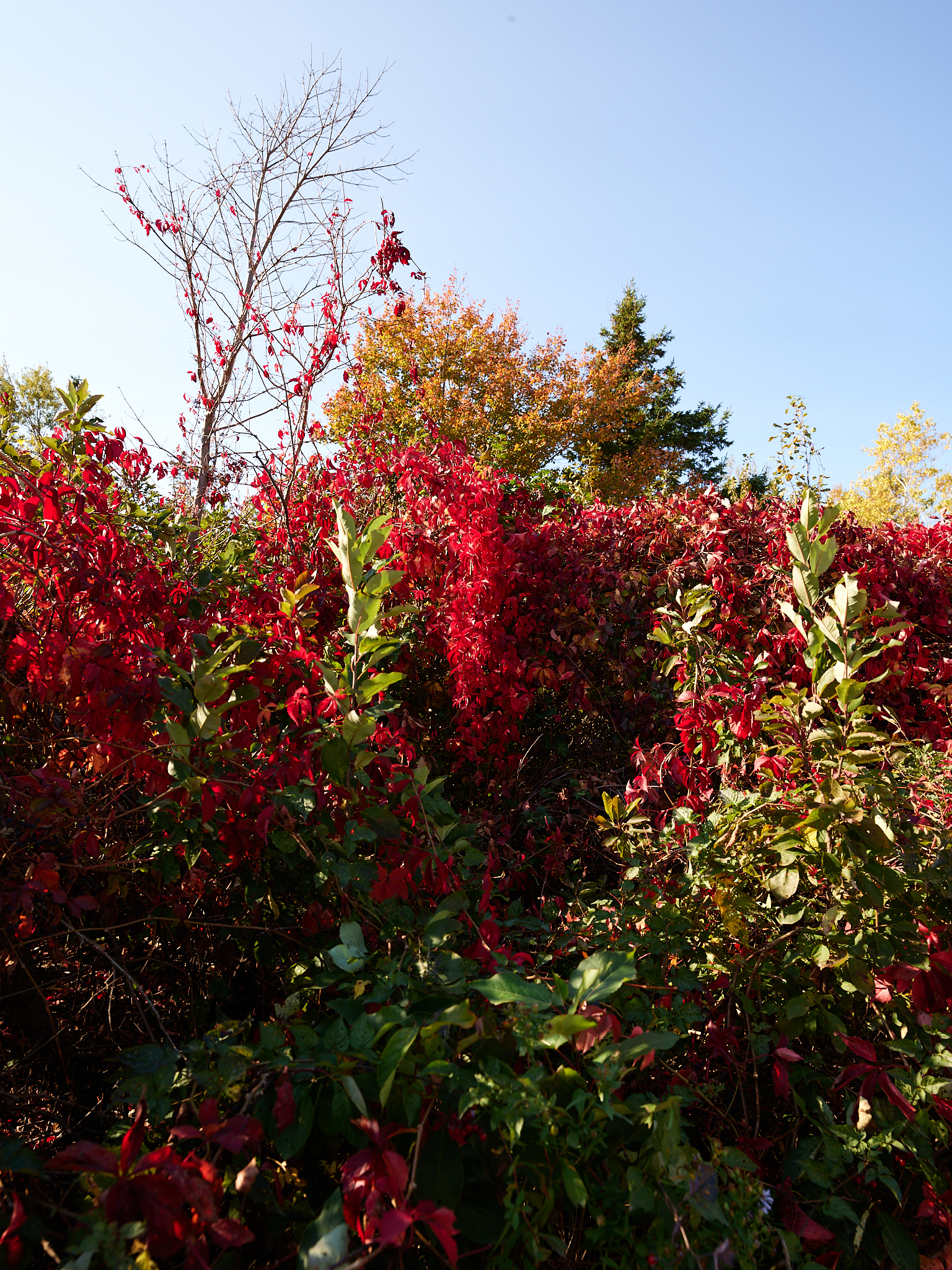
Green Gables Garden
French River and Cape Tyron Lighthouse
The trip to and the experience at French River and Cape Tyron Lighthouse is exhilarating. It is everything I hope PEI would provide during my visit to the island. I want long beaches, dunes, red sandstone cliffs, salt water marshes, bays and harbors. I get all of it. I want to see something created by a rias. A large example of a rias Charlottetown, It is my understanding that the French River basin is also formed by rias.
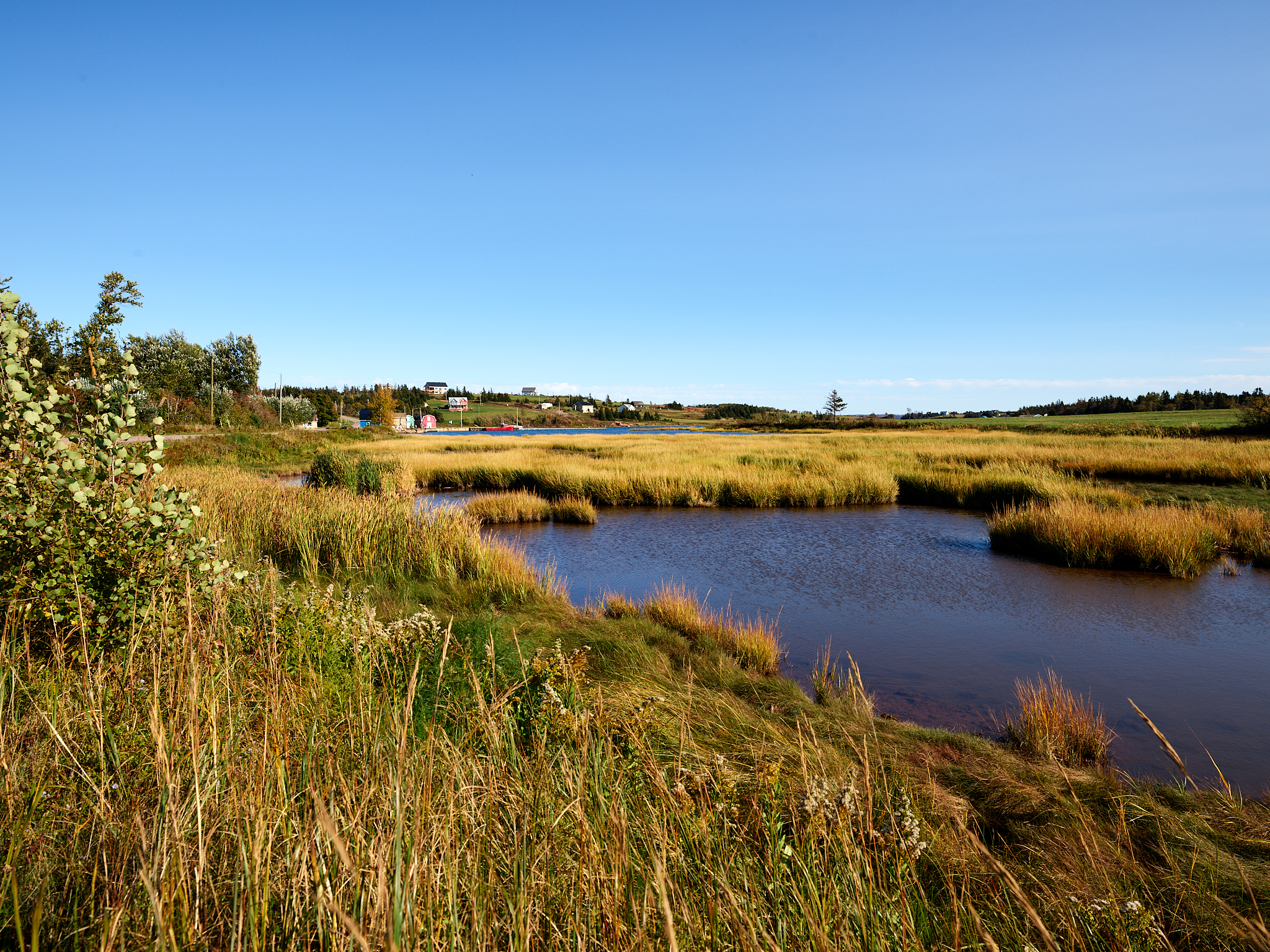
The village of French River. The river, saltwater marsh, and estuary flow to the southeast back into the Gulf of St. Lawrence on PEI.
The route to French River straddles the coastline going through the Town of Stanley, and over the Stanley Bridge, and the village of Springbrook. Each curve and turn on the highway reveals a new site to behold.
Upon leaving the village of French River, the road becomes unpaved and somewhat rough. Now I really feel at-home. While the road is not nearly as rugged or dangerous as the Mohini Camp 10 Road and the Alakai Wilderness in Kauai or the Forest Service Road 669 up to Roof Top of Railroad Ridge from the Livingston Mine in Idaho, it feels like the PEI candidate.
The last part of the route to the Cape Tyron Lighthouse has no road signs or markings. Google maps is not much help here. However, it is Linda and Jeff route-finding on a road trip. For me, No better combo.
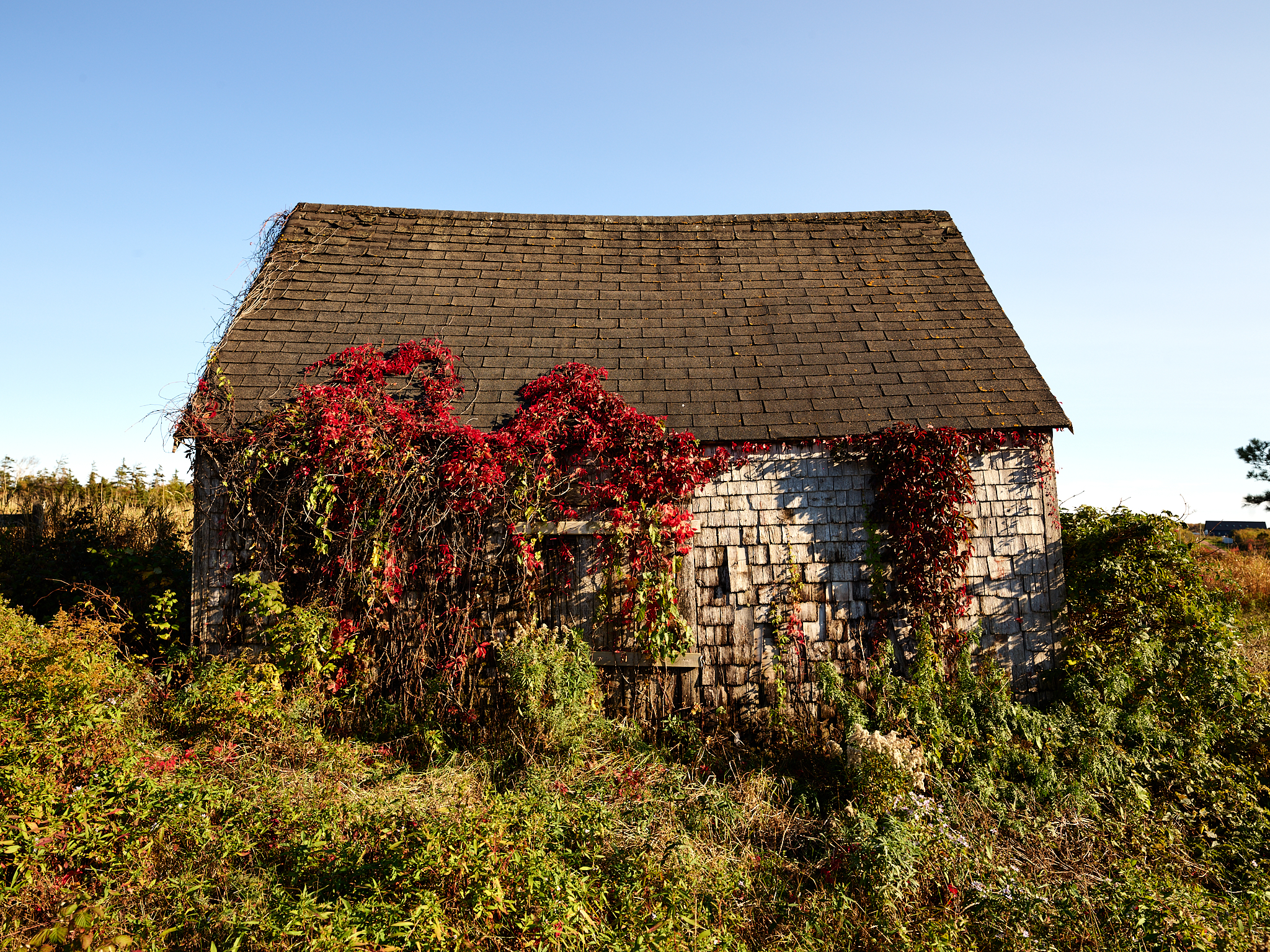
The Last landmark at French River.
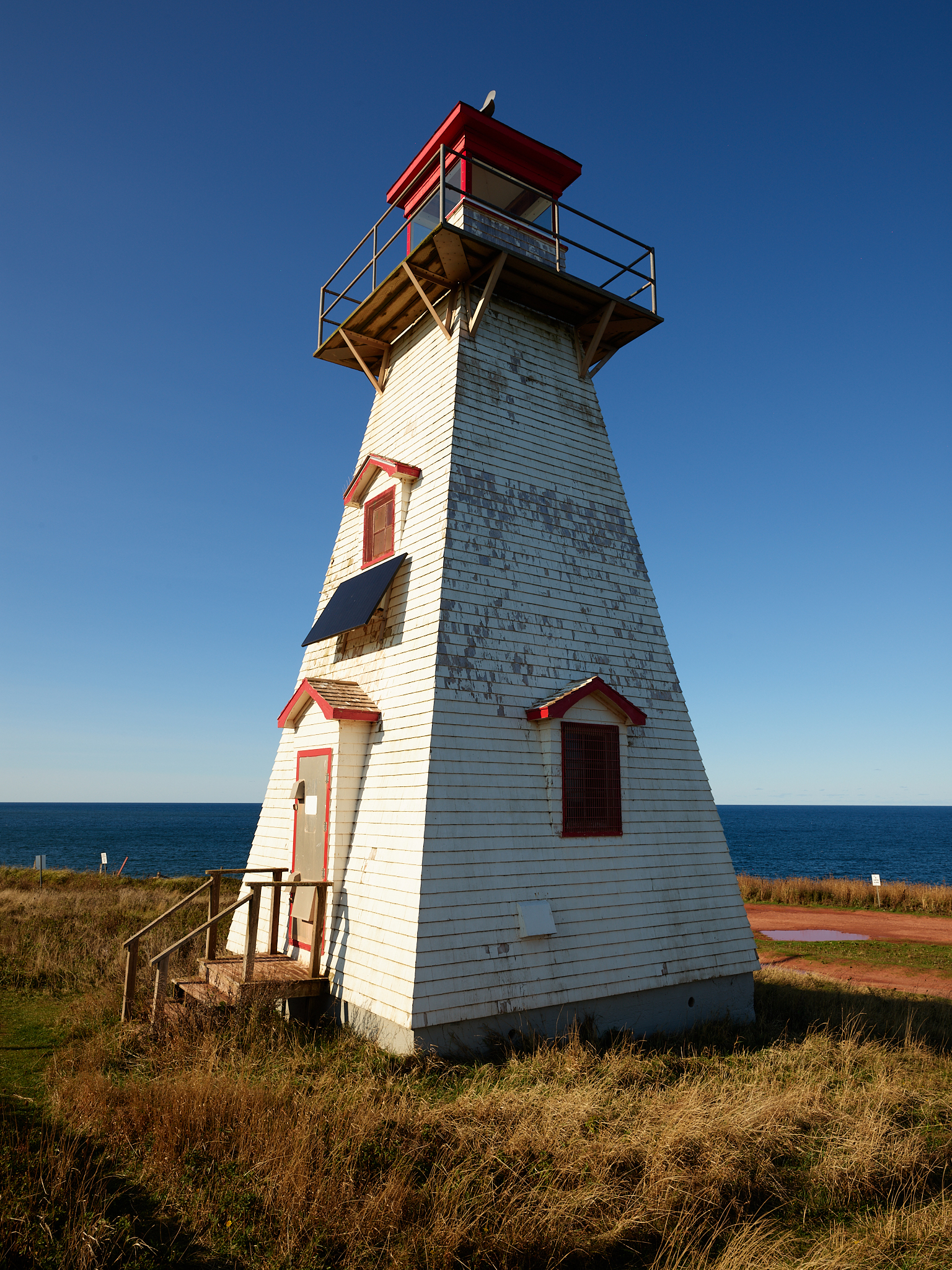
Cape Tyron Lighthouse.
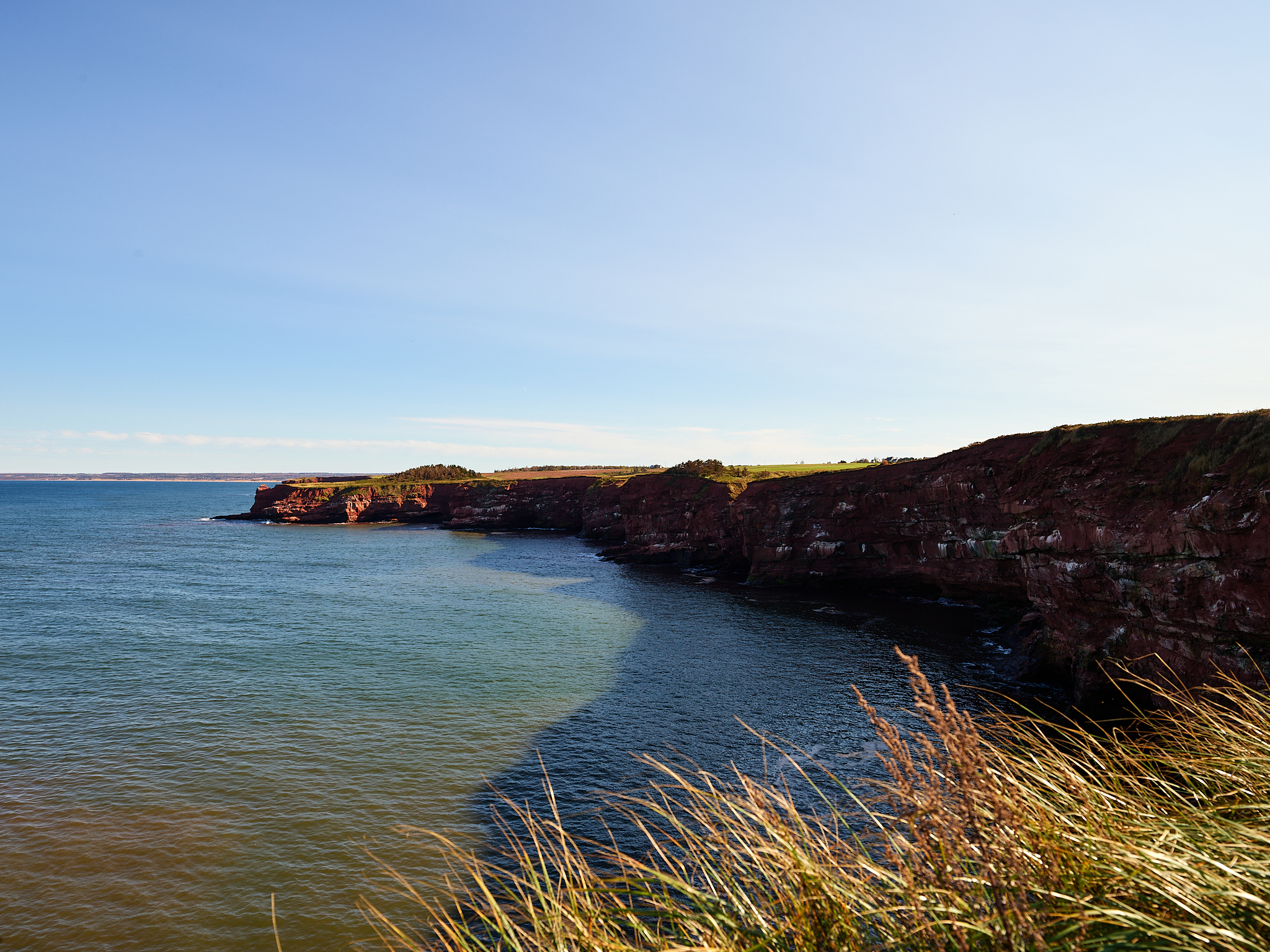
Cape Tyron
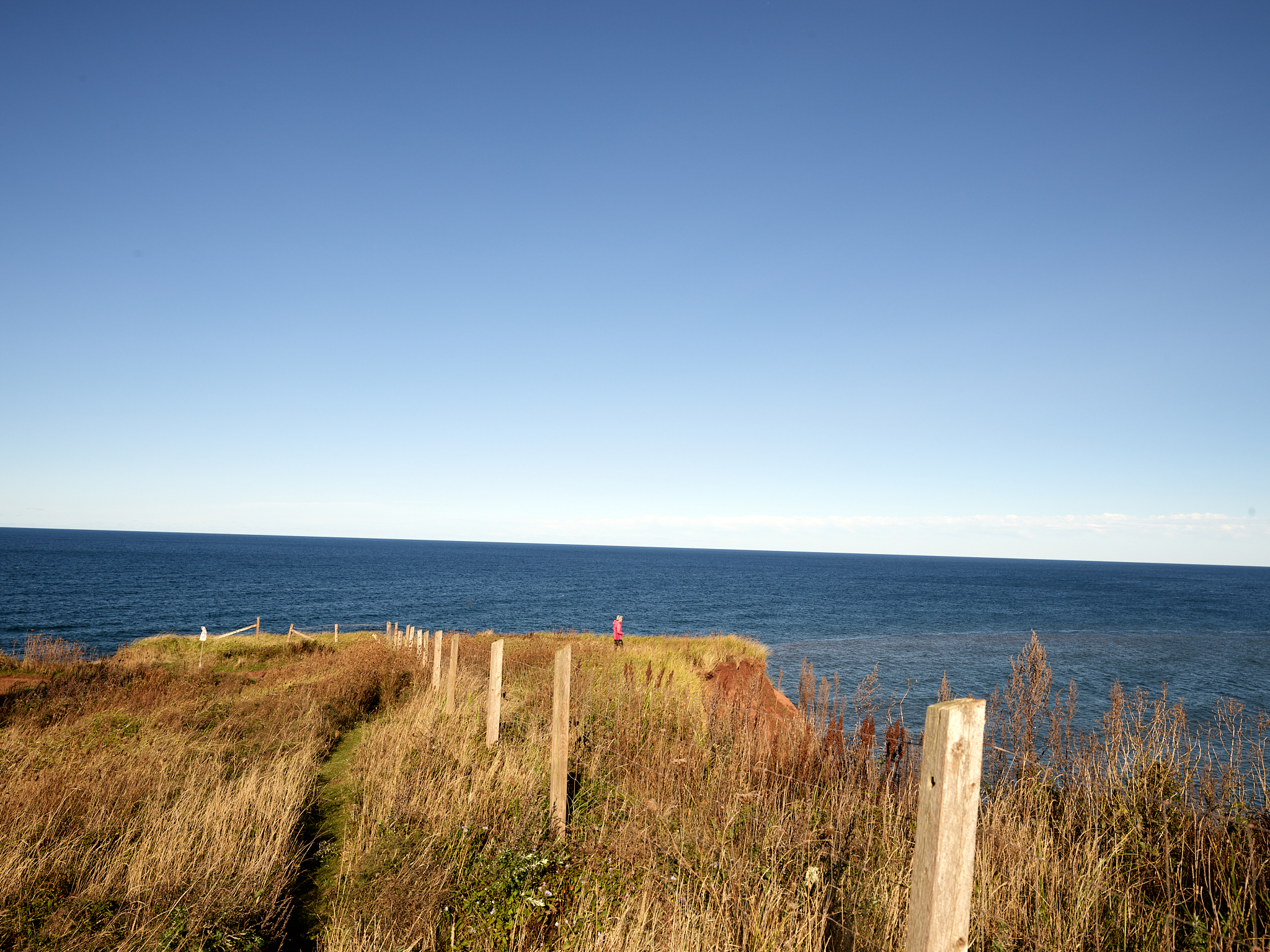
Linda exploring the Cliffs at Cape Tyron
The place is ours. No one is here. This is a working Lighthouse. There are no parking meters, or parking spots for tour buses. There is no tourist shop or Interpretive Center. Nothing.
Linda and I explore the Lighthouse grounds, the cliffs and gaze out on the cape as the sun lowers to the west. I am in absolute heaven.
Covehead Harbor and Lighthouse
Covehead Harbor and Lighthouse is an Icon of Canada, Prince Edward Island, and the Canadian National Park System. The Harbor drains/fills Brackley Bay and Covehead Bay into/from the Gulf of St. Lawrence. The Covehead Harbor Lighthouse stands on one of 51 lighthouse sites in PEI. Forty-four of the lighthouses remain standing, with 41 operational.
Linda & I drive from French River and Cape Tyron such that we will reach the area as the Golden Hour for photography begins. We arrive on time. We expect that it will be crowded with visitors hoping to experience something similar as us. We are worried the scene will be similar to that of Acadia National Park in the US less than a week earlier. At Acadia hoards of people, cars, and tour buses are packed like sardines attempting to get a glimpse of nature.
Shock
We are shocked as we arrive. The multiple toll booths to the entrance of the park are not maned or operating. The endless levels of parking spaces to handle cars, trucks, and tour buses are effectively empty. There must be hundreds of empty parking spaces on the shoreline driving route. Only one other car appears at the lighthouse pullout during our visit. And it is pulling away.
In short, Covehead Harbor, its beaches, and Lighthouse are ours for the taking. What an experience.
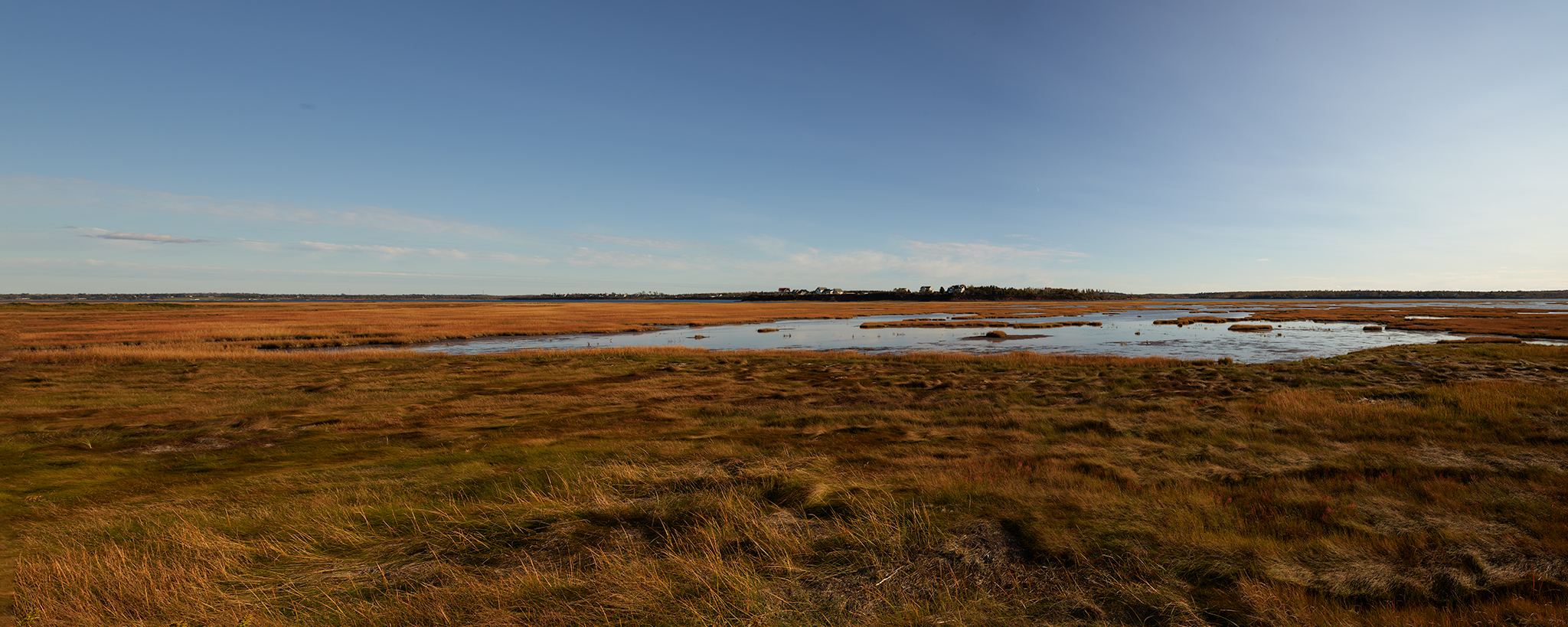
Brackley Bay and Covehead Bay at their joining point.

Covehead Harbor Lighthouse
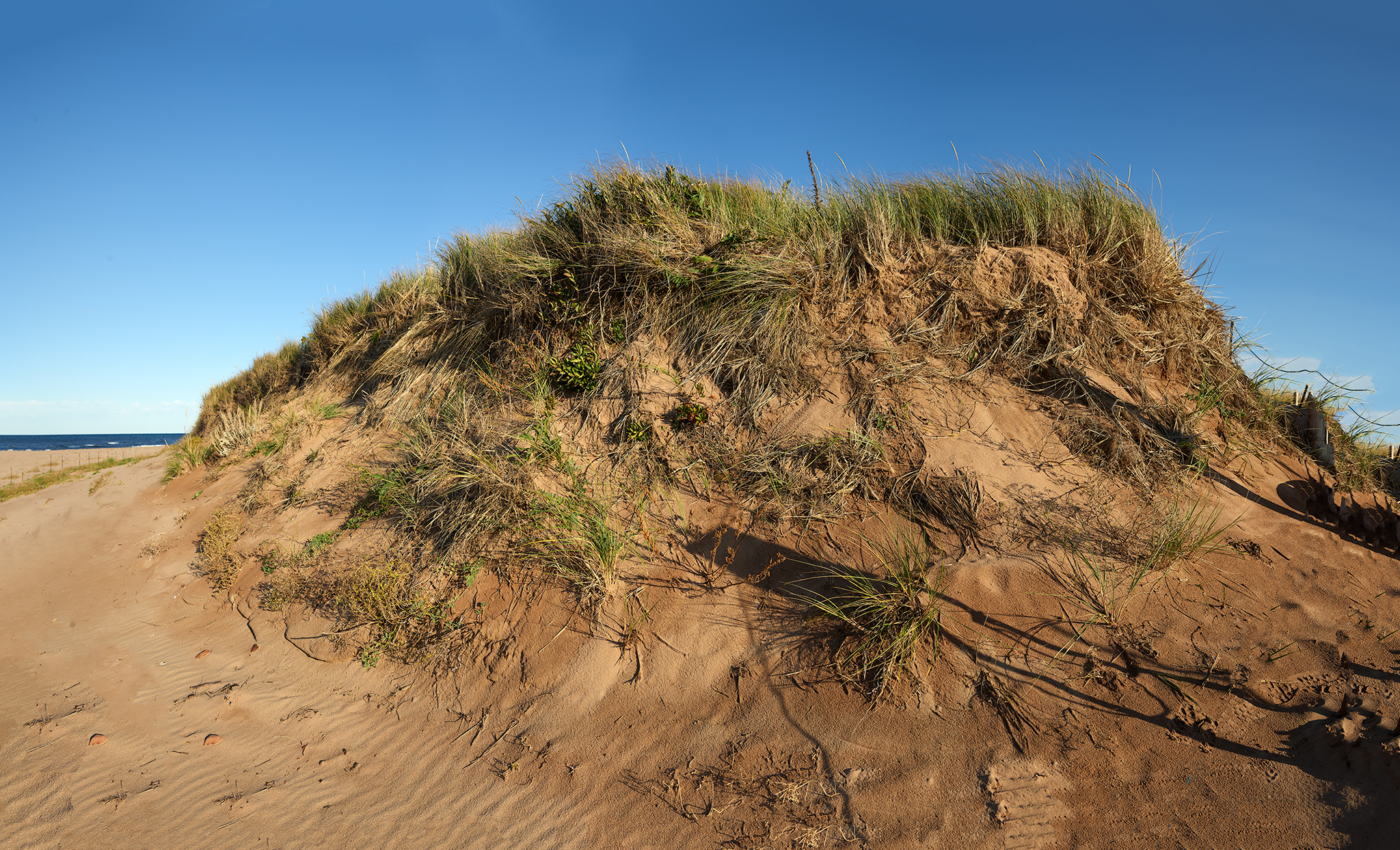
Sand dune at Covehead Harbor Lighthouse
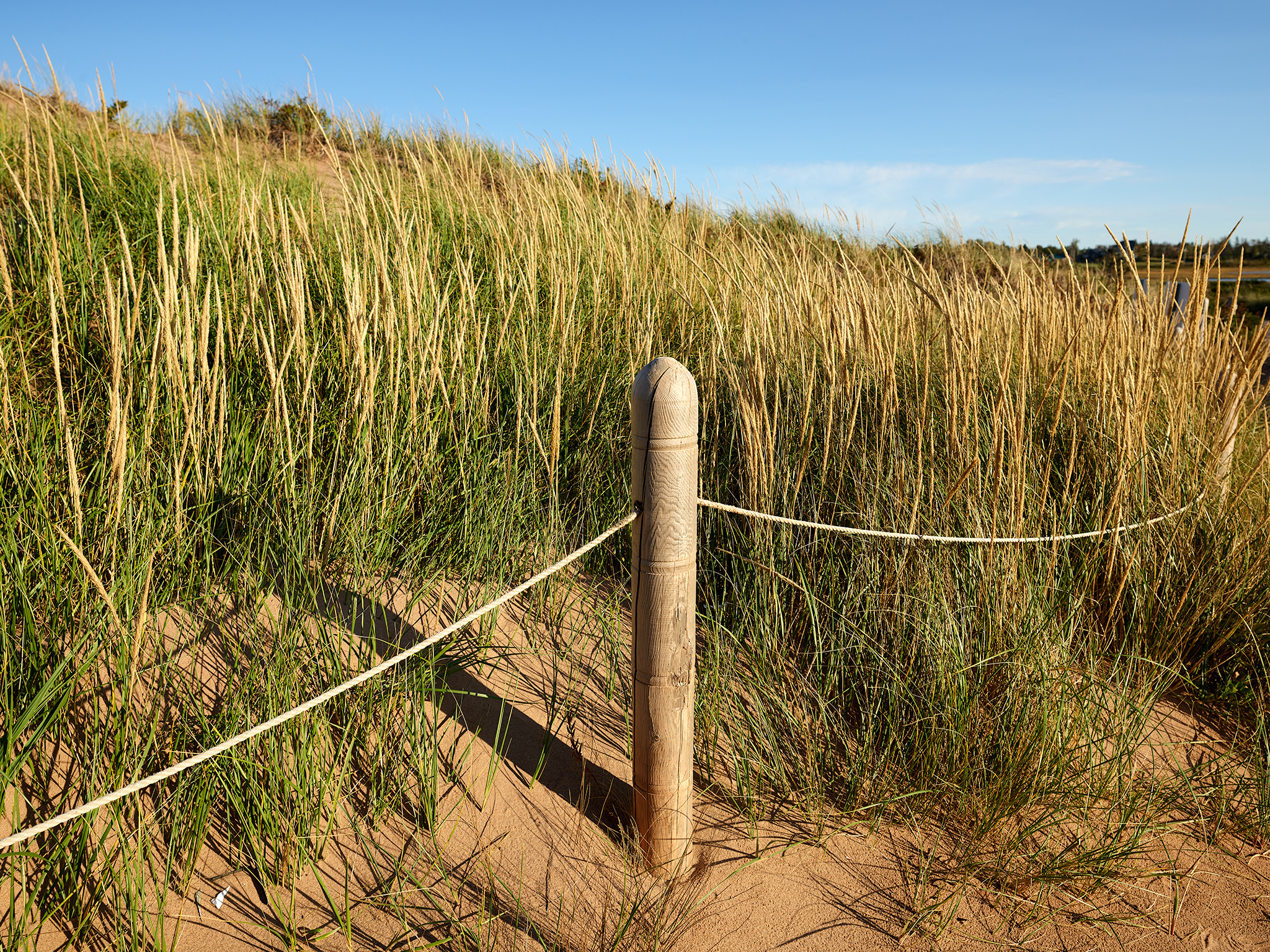
Native grasses at Covehead Harbor Lighthouse
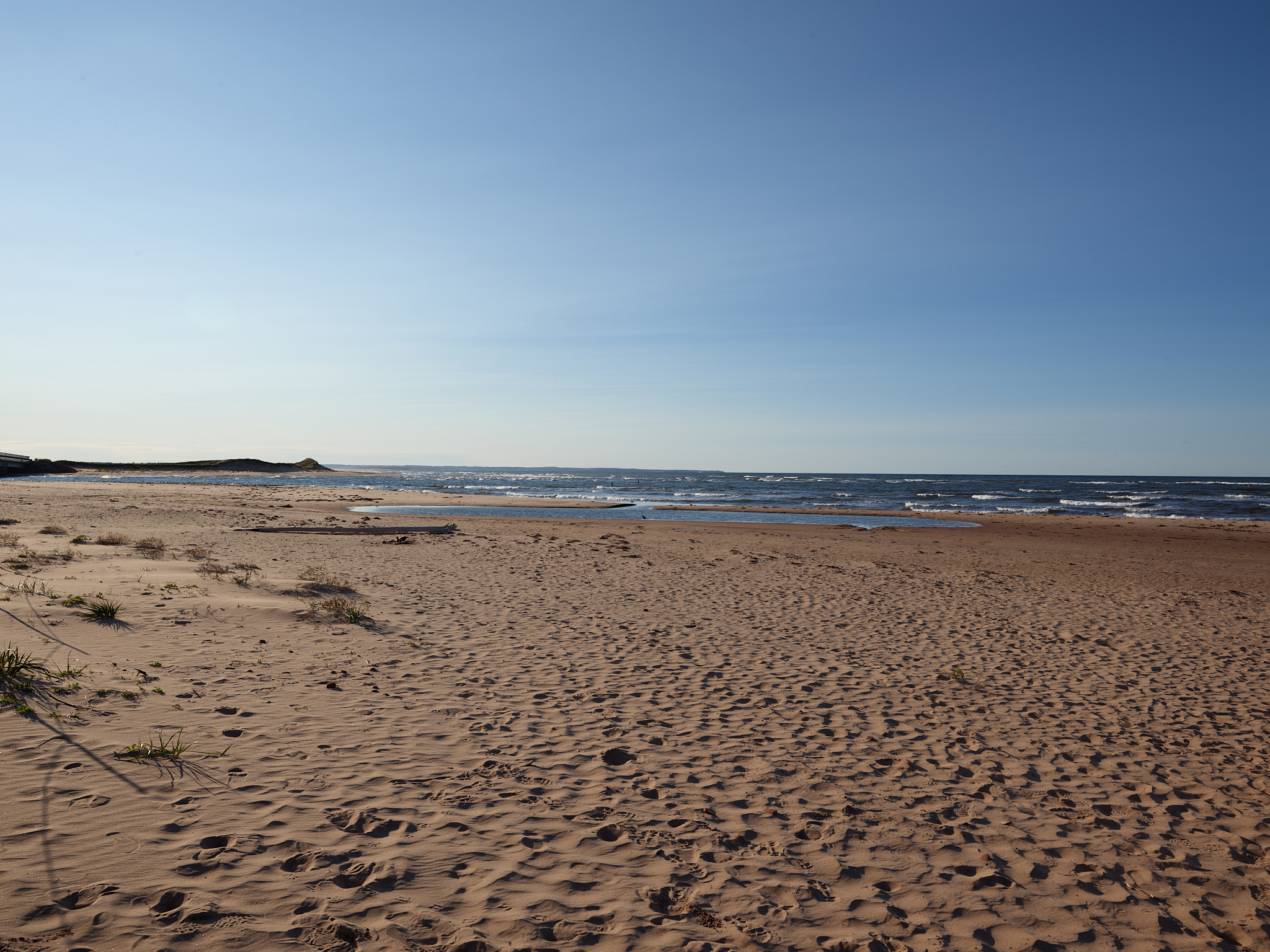
The beach at Covehead Harbor Lighthouse
Charlottetown
Charlottetown is not what I expect. The city is larger and more urban than I anticipate. The downtown city center possesses the character and charm of its past. Plus, there is a nice vibe of today and the future. There are many fun and interesting restaurants as well. The churches are impressive. Downtown Charlottetown is alive.
However, the rest of the area within the city limits and outside the downtown felt like any city in the U.S. This is not a bad thing. It is simply something I did not experience in the rest of the Maritimes. The exurbs exhibit the same trait. There is nothing particularly wrong about the setting. However, it felt as if I could be in Peoria Illinois, Olathe Kansas, Lansing Michigan or Carmel Indiana. There is an upside to the situation. If you you need a BestBuy or Dominoes Pizza you are in luck.
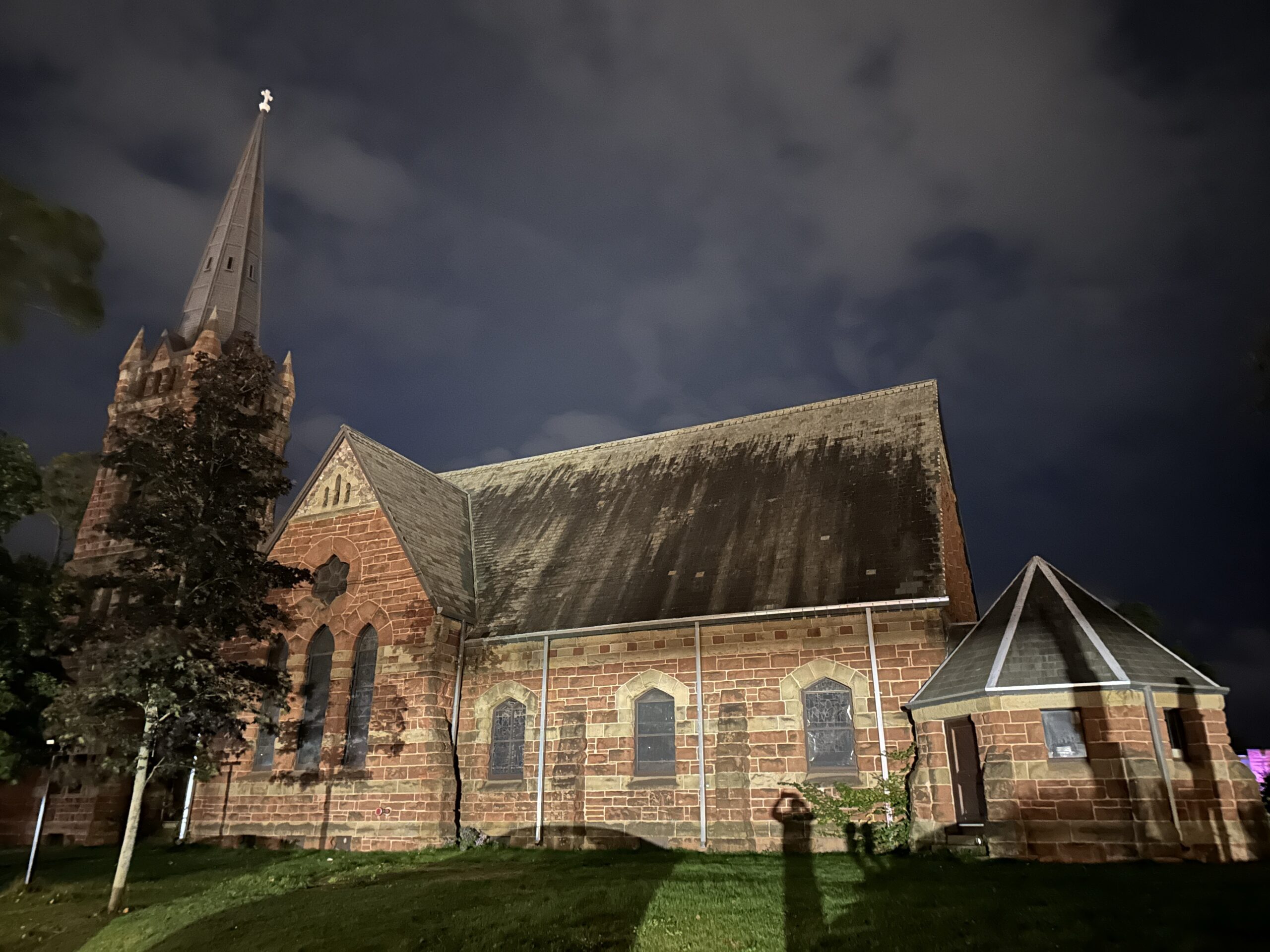
The churches downtown were impressive.
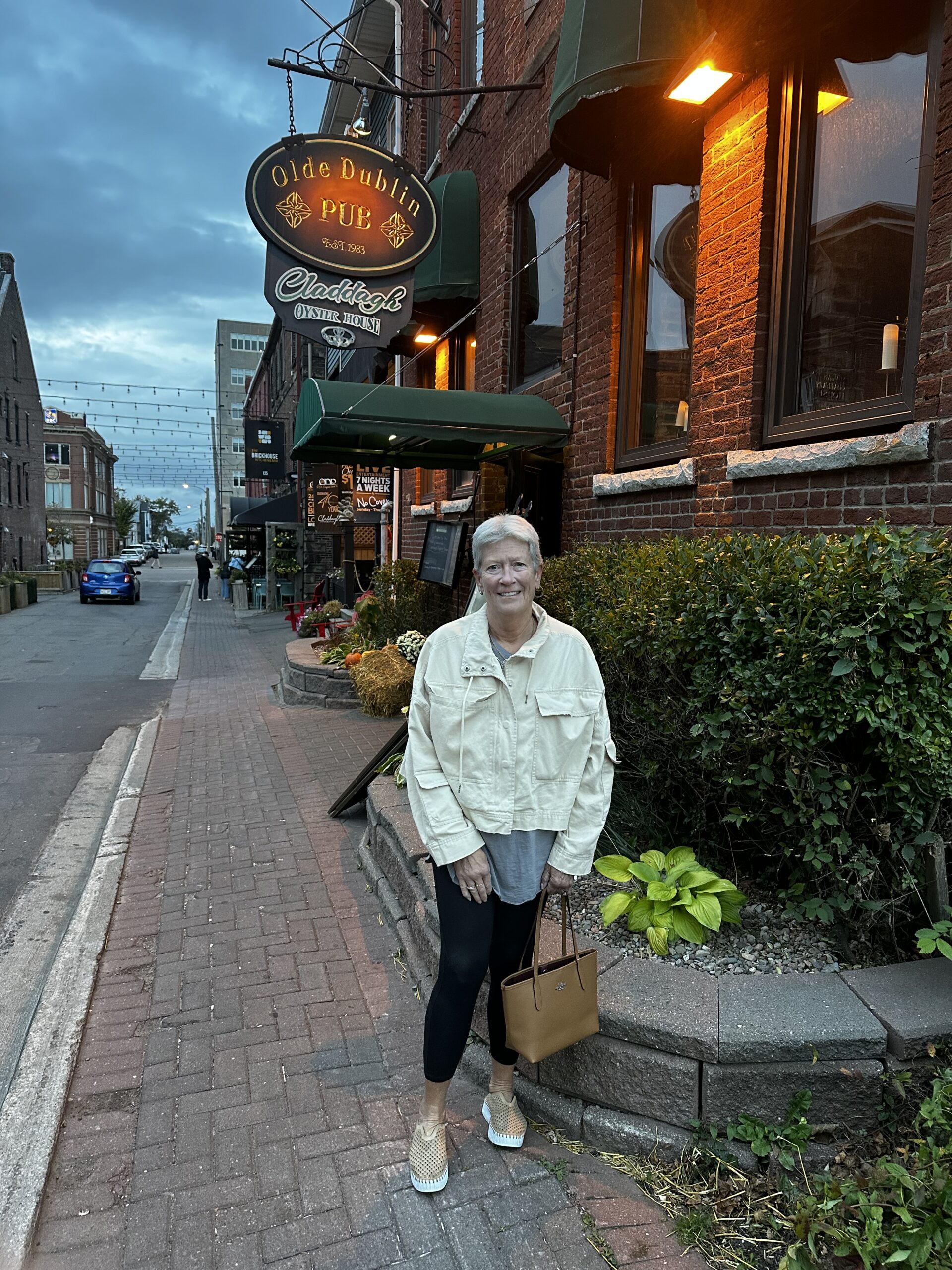
There were plenty of interesting side-streets with a variety of nice restaurants downtown.

Great pics – especially the last 1
Thanks Tom.
I told Linda of your comments.
I am so fortunate. Linda is the best travel partner.
NICE!
One of your best posts ever.
Thanks Mike. Coming from you that means a great deal.